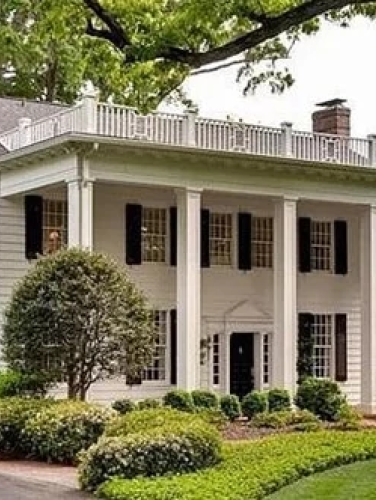
Frank R. McNinch House
(ca. 1925)
Former Charlotte Mayor Frank R. McNinch briefly lived in this Sharon Lane home before his appointments to high-ranking positions in the Hoover and Roosevelt administrations.
2401 Sharon Ln, Charlotte, NC 28211
In the mid-1920s when Frank Ramsay McNinch (1873-1950) commissioned the construction of his Colonial Revival style house on Sharon Lane, he envisioned practicing law in Charlotte and living in the quiet of the country, surrounded by the oak trees and peach orchards he had cultivated since purchasing the nearly 44-acre parcel in 1913. His family only enjoyed living in their new home until 1930, when he was called to spend the rest of his life in Washington, D. C., as a high-ranking government official appointed by both Republican and Democratic administrations. The family kept the house for thirteen years, but their visits to Charlotte were confined to holidays and vacations.
Property Quick Links
Frank’s father Franklin Alonzo McNinch (1841-1893), a South Carolina native who fought in the Civil War, moved the family to Charlotte in 1866 and started the family tradition of political involvement. Over twenty-five years, the elder McNinch held several public offices, including chief of police, trial justice, fire chief, and superintendent of the city quarry. His son Samuel Sylvanus McNinch (1867-1929 served as mayor of Charlotte (1905-1907) and several terms on the city’s board of aldermen. As for Frank, after receiving his law degree from the University of North Carolina, he returned to Charlotte to practice law, before being elected to the state House of Representatives in 1905. Twelve years later, Frank McNinch was elected to the mayoral office, guiding the city through World War I, the transition into a new commission form of city government, and a bloody 1918 streetcar strike. After election to a second term as mayor, he resigned in 1921 to become the regional representative of the National Recreation Association.
In 1930 Republican President Herbert Hoover appointed McNinch, an independent Democrat, to a seat on the Federal Power Commission. President Franklin D. Roosevelt later elevated McNinch to the chairmanship of the Federal Power Commission (1933-1937), placing McNinch in the middle of the controversy over the Tennessee Valley Authority. McNinch also served as Roosevelt's representative to the executive council of the World Power conference at the Hague. When controversy arose at the Federal Communications Commission in 1937, Roosevelt named McNinch as that agency’s chair. In 1939 McNinch resigned that position to accept less taxing duties as Special Assistant to the Attorney General, a position he held until his 1946 retirement.
By 1943, already in declining health and nearing retirement, McNinch and his wife Huldah (1894-1969) conceded that the family had relocated permanently to Washington and that it was no longer feasible to keep the Charlotte house. Howard M. Wade, a manufacturer of bank and office furnishings, purchased the house in 1943 as a gift for his daughter Isabelle Reynolds and her family. The family of C. P. Street of the prominent construction firm McDevitt and Street purchased the house in 1959. The house has since changed hands several times. In the early 2020s, new residential infill was introduced onto the house’s remaining three-acre parcel.

